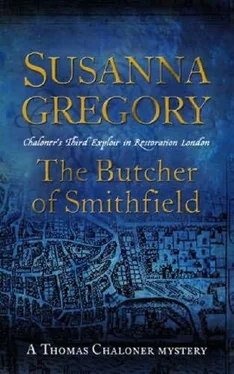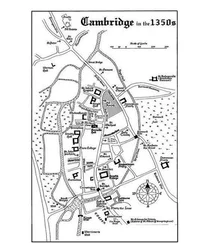Susanna Gregory - The Butcher Of Smithfield
Здесь есть возможность читать онлайн «Susanna Gregory - The Butcher Of Smithfield» весь текст электронной книги совершенно бесплатно (целиком полную версию без сокращений). В некоторых случаях можно слушать аудио, скачать через торрент в формате fb2 и присутствует краткое содержание. Год выпуска: 2010, ISBN: 2010, Издательство: Little, Brown Book Group, Жанр: Исторический детектив, на английском языке. Описание произведения, (предисловие) а так же отзывы посетителей доступны на портале библиотеки ЛибКат.
- Название:The Butcher Of Smithfield
- Автор:
- Издательство:Little, Brown Book Group
- Жанр:
- Год:2010
- ISBN:9780748124541
- Рейтинг книги:5 / 5. Голосов: 1
-
Избранное:Добавить в избранное
- Отзывы:
-
Ваша оценка:
- 100
- 1
- 2
- 3
- 4
- 5
The Butcher Of Smithfield: краткое содержание, описание и аннотация
Предлагаем к чтению аннотацию, описание, краткое содержание или предисловие (зависит от того, что написал сам автор книги «The Butcher Of Smithfield»). Если вы не нашли необходимую информацию о книге — напишите в комментариях, мы постараемся отыскать её.
The Butcher Of Smithfield — читать онлайн бесплатно полную книгу (весь текст) целиком
Ниже представлен текст книги, разбитый по страницам. Система сохранения места последней прочитанной страницы, позволяет с удобством читать онлайн бесплатно книгу «The Butcher Of Smithfield», без необходимости каждый раз заново искать на чём Вы остановились. Поставьте закладку, и сможете в любой момент перейти на страницу, на которой закончили чтение.
Интервал:
Закладка:
‘He will not appreciate being kidnapped, if that is what you have in mind. But I doubt anything will happen tonight — the Hectors will be too busy looking for you, for a start. We will act in the morning.’
‘And do what?’
‘I will think of something. You concentrate on solving Newburne’s murder for your Earl.’
Thurloe’s servant made up a bed for Chaloner in Thurloe’s sitting room, but although the ex-Spymaster swallowed a sleeping draught and retired immediately, Chaloner was too unsettled for rest, despite his bone-deep weariness. He sat crossed-legged in front of the dying fire and made piles of the four sets of music; the one from Maylord’s chimney, the one L’Estrange had given him, the one Hickes had taken from Finch’s room, and the one Hickes said he had found in Hodgkinson’s print-shop. The light was poor, but it was enough to work by.
He compared them minutely, his curiosity piqued by Thurloe’s suggestion that they should not be too readily dismissed. All were penned by the same hand, and when he picked them out on Thurloe’s virginals — certain the noise would not bother Thurloe after whatever medicine he had taken — they sounded unpleasantly similar. Then he recalled the tiny scroll that had been in Smegergill’s ring. The brief glance he had been allowed before Greeting had destroyed it had put him in mind of a cipher key — a crib for decoding secret messages. He recalled that a C-sharp was a T and an E-flat was a W. Could the music actually represent a message, and it was not the tune that the composer was trying to communicate to his listeners, but something else? Obviously, there were only seven note-names to twenty-six letters in the alphabet, but there were sharps and flats that could be taken into consideration, along with beats of different duration — minims, crotchets and quavers.
He started with the music from Finch’s room, because it was the shortest, working on the premise, familiar to all spies, that some letters were used more frequently than others. It was a sequence Thurloe had drilled into him years ago, and had enabled him to break into many a secret. The most commonly occurring letter in English was E, so he went through the music, and determined that the most commonly occurring note was a B. The next most common letter was T, followed by A, the latter of which seemed to correspond to a G, but one that was two beats in duration.
He made mistakes, and had to keep reworking what he was doing, but eventually a pattern began to emerge, and the idea was so simple that he wondered why he had not seen it before. Words began to appear, although they were interspersed with meaningless letters, a device to ensure the tune was not too outlandish. He began crossing out the extraneous ones, until he had a message that made sense — or rather, he had a collection of words in a rational order, which was not the same thing.
BE WARY. TOO MANY HORSES.
Too many horses for what? He moved on to the compositions he had recovered from Maylord’s chimney, barely aware of the watchmen calling two o’clock, and then three.
SHERARD LORINSTON. GROCER OF SMITHFIELD. LARGE SAD BAY MARE. MOTHER FIRST NEWE MOON WEATHER PERMITTING.
The next one read:
JAMES BRADNOX. VINTNERS HALL. THURSDAY FOLLOWING. GUILD MEETING.
And so it went on, message after message Heart pounding, he turned to L’Estrange’s piece.
RICHD SMITH. BELL SMITHFIELD. BRIGHT BAY MARE. SAINTE LUKE DAY EVE. THEATER.
Chaloner stared at it. He had met Richard Smith in Brome’s shop. The man had been placing an advertisement in The Newes , because his ‘bright bay mare’ had been stolen, and he wanted its safe return. Chaloner consulted Thurloe’s almanac, and learned that the Feast of St Luke was the fifteenth day of October, which was roughly when the man said the horse had been stolen. With a start, Chaloner also recalled him say that the thief was Edward Treen, who had been spotted in the very act of stealing the beast. The music was telling someone that on the eve of St Luke’s Day, Richard Smith had been planning to go to the theatre.
Chaloner chewed the end of his pen. Was that the essence of the messages? That someone was gathering information about the movements of men with horses, and was arranging to have them stolen? Had Pettis the horse-trader and Beauclair the equerry been part of the operation? Or had they been killed because they had worked out what was going on? And if Treen, one of the trio that was causing Chaloner so much trouble, had stolen Smith’s horse, then were his fellow Hectors responsible for the other thefts, too? Chaloner imagined they were.
He finished decoding the messages, grinning his satisfaction when one contained a note about Beauclair’s black stallion, then searched Thurloe’s bookshelves until he found back issues of The Newes and The Intelligencer . It did not take him long to learn that most of the men mentioned in the music had bought notices in the newsbooks, offering rewards for their animals’ return. So, what did that tell him? It certainly confirmed what he had heard in the coffee houses: that if a valuable animal was taken, then the best way to ensure its recovery was to advertise in the newsbooks.
Maylord had owned a horse. Had it been stolen? Chaloner trawled all the way back to L’Estrange’s very first publication, but Maylord had never placed an advertisement if it had. Was this the secret that Maylord had learned about Newburne, and Thurloe was right in that it had nothing to do with Newburne’s jewels? Chaloner lay on the mattress, but there were still far too many questions to allow him to sleep.
* * *
Events were beginning to spiral out of Chaloner’s control. It was only a matter of time before the Hectors tracked him down and tried to kill him, and he only had one more full day left to solve Newburne’s murder. He rose long before dawn with a sense of foreboding, thinking about what had happened, what he had learned, and the questions he still needed to answer. He woke Thurloe, sitting on the edge of the bed to regale the drowsy ex-Spymaster with an account of what the music meant.
‘And the fact that Smegergill started to wear the ring after Maylord’s death means he knew about the music, too,’ he concluded.
‘You are almost certainly right. Smegergill must have been determined to feather his nest at any cost. Perhaps he even helped with the encoding or decoding — he made money from these horse thefts, as well as aiming to get Newburne’s jewels and Maylord’s inheritance. I never did like the man.’
‘So, he had two reasons for smothering Maylord,’ mused Chaloner. ‘He wanted his inheritance and he was afraid Maylord would expose the horse-theft business.’
‘It explains why Ireton was ready to commit murder with him — he was protecting Hector business, as well as doing a favour for his friend and music-master. So, at last you know what frightened Maylord: it started with a hare-brained scheme — probably devised in the heat of the moment and later regretted — to defraud Newburne of his jewels, but it ended with him stumbling into the Hectors’ latest venture.’
‘He must have found the coded music while acquiring Newburne’s keys and, being a musician, it piqued his interest. He must have taken some, and become worried when he realised its significance.’
‘Do you think Finch was translating the music when he was murdered?’ asked Thurloe.
‘No, because he was playing it at the time. You do not need to play it to translate — in fact, it is better if you do not, because the melody is irrelevant. But there was a second person in the room when Finch died, someone eating a pie. I suspect he knew what the music entailed, and killed Finch to make sure he never worked it out.’
Читать дальшеИнтервал:
Закладка:
Похожие книги на «The Butcher Of Smithfield»
Представляем Вашему вниманию похожие книги на «The Butcher Of Smithfield» списком для выбора. Мы отобрали схожую по названию и смыслу литературу в надежде предоставить читателям больше вариантов отыскать новые, интересные, ещё непрочитанные произведения.
Обсуждение, отзывы о книге «The Butcher Of Smithfield» и просто собственные мнения читателей. Оставьте ваши комментарии, напишите, что Вы думаете о произведении, его смысле или главных героях. Укажите что конкретно понравилось, а что нет, и почему Вы так считаете.












